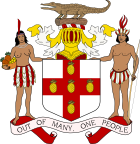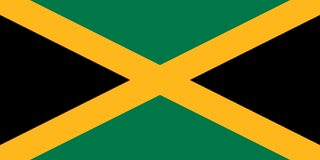The Jamaica Labour Party (JLP) is one of the two major political parties in Jamaica, the other being the People's National Party (PNP). While its name might suggest that it is a social democratic party, the JLP is actually a conservative party. However, it has longstanding ties to the Jamaican labour movement.

Elections in Antigua and Barbuda take place in the framework of a parliamentary democracy.

Parliamentary elections were held in Chad on 21 April 2002. The result was a victory for the ruling Patriotic Salvation Movement (MPS), which won 113 of the 155 seats in the National Assembly.

General elections were held in Belize on 14 December 1984. The result was a victory for the opposition United Democratic Party, which won 21 of the 28 seats. Voter turnout was 75.0%.

Parliamentary elections were held in Senegal on 3 June 2007. They had originally been planned to be held together with the presidential election on 25 February 2007, but were postponed. Fourteen parties or coalitions participated in the elections, but they were marked by a major opposition boycott. The ruling Sopi Coalition won 131 seats, including all 90 of the seats elected by majority voting.

The Fifth National Parliamentary Elections 1991 were held in Bangladesh on 27 February 1991. The result was a victory for the Bangladesh Nationalist Party, which won 140 of the 300 seats. Voter turnout was 55.4%. As a result, BNP leader Khaleda Zia was sworn in as Prime Minister on 20 March.
The East Renfrewshire by-election, 1940 was a parliamentary by-election held on 9 May 1940 for the British House of Commons constituency of East Renfrewshire in Scotland.
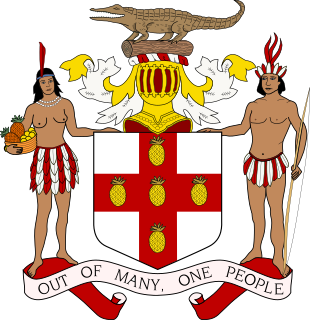
General elections were held in Jamaica on 18 December 1997. The ruling People's National Party of Prime Minister P. J. Patterson won 50 of the 60 seats defeating the main opposition Jamaica Labour Party.
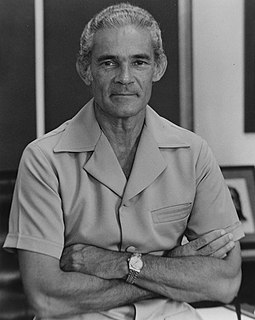
General elections were held in Jamaica on 9 February 1989. The result was a victory for the People's National Party, which won 45 of the 60 seats. Voter turnout was 78.4%.

General elections were held in Singapore on 19 April 1968, the first as an independent state following the island's expulsion from Malaysia. The elections were boycotted by all opposition parties except the Workers Party, which only contested two constituencies. With five independents also running, only seven seats were contested, resulting in People's Action Party (PAP) candidates returned unopposed in the other 51 seats, a first in history PAP returned to power during nomination day.

General elections were held in Northern Rhodesia on 20 and 21 January 1964. There were two voter rolls for the Legislative Council, a main roll that elected 65 seats, and a reserved roll that elected 10. Africans elected the main roll, whilst Europeans elected the reserve roll. Other ethnicities were allowed to choose which roll to be part of. The United National Independence Party won the elections, taking 55 of the common roll seats. Its leader, Kenneth Kaunda became Prime Minister, leading the country to independence in October that year, at which point he became President. Voter turnout was 94.8% for the main roll and 74.1% for the reserved roll.
Julien Bentley Royer is a Dominican politician in the Dominica Labour Party and a former schoolteacher. He served briefly as a senator in the Dominica House of Assembly in 2010, and has twice been an unsuccessful candidate for an elected seat.

The 2011 Jamaican general election was held on 29 December 2011 in Jamaica. The election was contested mainly between the nation's two major political parties, the governing Jamaica Labour Party (JLP), led by Andrew Holness, and the Portia Simpson-Miller-led opposition People's National Party (PNP). The result was a landslide victory for the PNP which won 42 of the 63 seats, a two-thirds majority.

General elections were held in Jamaica on 25 February 2016. The elections were largely a contest between the governing People's National Party (PNP) and the opposition Jamaica Labour Party (JLP). The result was a narrow victory for the JLP, which won 32 of the 63 seats. One political commentator described the poll as "the closest election Jamaica has ever had".
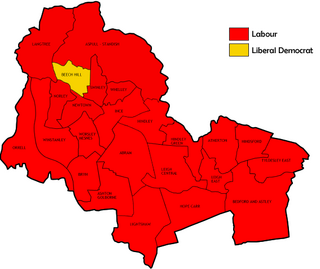
Elections to the Wigan council were held on Thursday, 5 May 1994, with one third of the seats up for election. Prior to the election, Labour had defended their seats in two by-elections for Abram and Hindley. The election suffered from a mixture of a poor contesting rate and low voter turnout. The number of candidates contesting was just 50, the lowest since 1975, with four wards going unopposed, and Lib Dems back to fighting a half of the seats, and the Conservatives less than two-thirds. The only other opposition standing were three Independent Labour candidates, one of which was the previous - but since deselected - Labour incumbent for the seat being fought in Worsley Mesnes. Voter turnout rose from the previous election's nadir, but at 30.4%, still well below average.
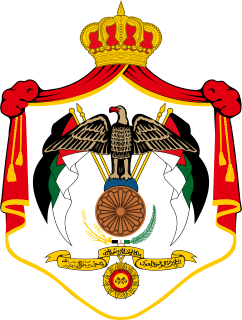
Early general elections were held in Jordan on 23 January 2013. Voter turnout was reported to be 56.6%.

Early general elections were held in Kuwait on 27 July 2013. The elections were required after the Constitutional Court dissolved Parliament and annulled the results of the December 2012 elections. Voter turnout was an estimated 52.5%, which was higher than expected despite an opposition boycott, and only 7% lower than the non-boycotted February 2012 elections.

Parliamentary elections were held in Belarus on 11 September 2016.
